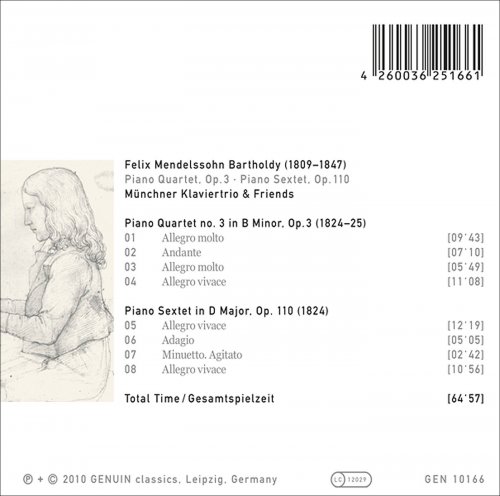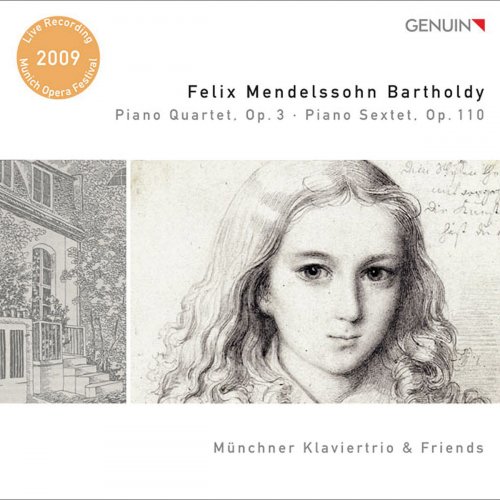
Munich Piano Trio - Mendelssohn, Felix: Piano Quartet, Op. 3 / Piano Sextet, Op. 110 (2010)
BAND/ARTIST: Munich Piano Trio
- Title: Mendelssohn, Felix: Piano Quartet, Op. 3 / Piano Sextet, Op. 110
- Year Of Release: 2010
- Label: Genuin
- Genre: Classical
- Quality: FLAC (tracks)
- Total Time: 64:48 min
- Total Size: 307 MB
- WebSite: Album Preview

Tracklist:
1. Piano Quartet No. 3 in B Minor, Op. 3: I. Allegro molto 9:43
2. Piano Quartet No. 3 in B Minor, Op. 3: II. Andante 7:10
3. Piano Quartet No. 3 in B Minor, Op. 3: III. Allegro molto 5:49
4. Piano Quartet No. 3 in B Minor, Op. 3: IV. Allegro vivace 11:08
5. Sextet for Piano and Strings in D Major, Op. 110: I. Allegro vivace 12:19
6. Sextet for Piano and Strings in D Major, Op. 110: II. Adagio 5:05
7. Sextet for Piano and Strings in D Major, Op. 110: III. Menuetto: Agitato 2:42
8. Sextet for Piano and Strings in D Major, Op. 110: IV. Allegro vivace 10:53
Moving forward a few decades, and from Vienna to Berlin, we encounter the Mendelssohn family. A distinguished upper-middle class family with ample nature and über nurture with the finest resources, luxuries and connections Europe could provide yielded perhaps the greatest musical prodigy of all time, Felix Mendelssohn. Felix was a very well educated and well-rounded musician who began composing serious masterworks by the time he was 14. To really grasp this extraordinary individual phenomenon, you need only listen to a short series of works spanning Felix’s meteoric rise to fame from aged 14 to 18: a string symphony, the piano sextet (on this program), the string octet, the overture to the Midsummer’s Night Dream, and his string quartet, Op. 13. For the rest of his life, he turned out masterpiece after masterpiece, yet another unquenchable musical avatar.
Felix has a sister, Fanny. In their youth, she was sometimes considered the more gifted musician. Felix and Fanny had a very close relationship throughout their lives including an ongoing exchange of musical scores and critiques forming a crucial dialog in both their individual musical lives. When Fanny died an untimely death due to stroke (which kicked their father and, in barely six months time, Felix himself), Felix became extraordinarily distraught, composing his final string quartet, one of his most intense works, as a eulogy. A fine musician and composer, Fanny was actively discouraged by her family from publishing her compositions or indeed from spending inordinate time on her music lest she neglect her chief concern and devotion as a wife and mother, a homemaker, not an artist.
With awe for what is clearly “all in the family” and especially for what Felix achieved, we will enjoy the Op. 110 Piano Sextet composed when he was merely 15 years old. With an unusual, warm and deep scoring for violin, 2 violas, cello, bass and piano, the sextet is the fine work of young genius amply reflecting his knowledge and love for Bach, Mozart and Beethoven as well as evincing his own mature, musical voice. A full, four-movement work worthy of masters twice his age, it is a rather glorious chamber concerto for piano and strings. The first movement is an ambitiously sprawling sonata form full of development including a cadenza and a substantial coda. The second, slow movement is sweet and noble, suggesting Mozart’s piano concerti as well as possibly his clarinet quintet due to his deployment of string mutes for a particularly evocative atmosphere. The minuet is really a Romantic scherzo with verve and a driving rhythm. The finale is a sparkling gallop, literally, after the French country-dance called the “galop” that became a popular craze in Paris, Vienna, Berlin and London right around the time Mendelssohn composed this sextet. Young Felix caps the surprising dark drama of the movement with a startling reprise of the muscular scherzo in a feature of “cyclic” form perhaps after Beethoven, but before Schubert and Franck and, as Felix would further develop in years hence.
Felix has a sister, Fanny. In their youth, she was sometimes considered the more gifted musician. Felix and Fanny had a very close relationship throughout their lives including an ongoing exchange of musical scores and critiques forming a crucial dialog in both their individual musical lives. When Fanny died an untimely death due to stroke (which kicked their father and, in barely six months time, Felix himself), Felix became extraordinarily distraught, composing his final string quartet, one of his most intense works, as a eulogy. A fine musician and composer, Fanny was actively discouraged by her family from publishing her compositions or indeed from spending inordinate time on her music lest she neglect her chief concern and devotion as a wife and mother, a homemaker, not an artist.
With awe for what is clearly “all in the family” and especially for what Felix achieved, we will enjoy the Op. 110 Piano Sextet composed when he was merely 15 years old. With an unusual, warm and deep scoring for violin, 2 violas, cello, bass and piano, the sextet is the fine work of young genius amply reflecting his knowledge and love for Bach, Mozart and Beethoven as well as evincing his own mature, musical voice. A full, four-movement work worthy of masters twice his age, it is a rather glorious chamber concerto for piano and strings. The first movement is an ambitiously sprawling sonata form full of development including a cadenza and a substantial coda. The second, slow movement is sweet and noble, suggesting Mozart’s piano concerti as well as possibly his clarinet quintet due to his deployment of string mutes for a particularly evocative atmosphere. The minuet is really a Romantic scherzo with verve and a driving rhythm. The finale is a sparkling gallop, literally, after the French country-dance called the “galop” that became a popular craze in Paris, Vienna, Berlin and London right around the time Mendelssohn composed this sextet. Young Felix caps the surprising dark drama of the movement with a startling reprise of the muscular scherzo in a feature of “cyclic” form perhaps after Beethoven, but before Schubert and Franck and, as Felix would further develop in years hence.
As a ISRA.CLOUD's PREMIUM member you will have the following benefits:
- Unlimited high speed downloads
- Download directly without waiting time
- Unlimited parallel downloads
- Support for download accelerators
- No advertising
- Resume broken downloads


